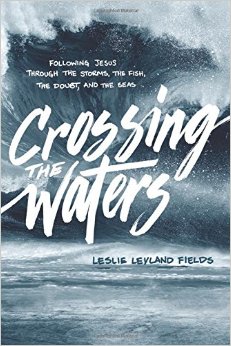
At nineteen, author Leslie Leyland Fields knew she wanted to marry Duncan, her college sweetheart, but she could have never anticipated where that yes would lead her. Thirty-nine years later, she has birthed six children and ten books while catching salmon off Alaska’s Kodiak Island. Not your average life — but Leslie is not your average woman.
Though we all have hopes and dreams for the future, few of us have a guaranteed trajectory for the next five years, let alone the entirety of our lives. We don’t know if we’ll sail through grad school and land that tenure-track position before we turn thirty or find ourselves juggling multiple part-time jobs to stay out of debt. We also don’t know how — or even if — following Jesus will influence our choices.
 Crossing the Waters: Following Jesus through the Storms, the Fish, the Doubt, and the Seas explores the wonder and complexity of saying yes to Jesus. In the introduction, Fields asks two questions that guide the narrative: What does it really mean when Jesus invites us to “Come, and follow me”? and What is his claim on all of our lives? She is well aware that, just like the disciples, when we choose to drop our nets and follow him, we often get more than we bargained for.
Crossing the Waters: Following Jesus through the Storms, the Fish, the Doubt, and the Seas explores the wonder and complexity of saying yes to Jesus. In the introduction, Fields asks two questions that guide the narrative: What does it really mean when Jesus invites us to “Come, and follow me”? and What is his claim on all of our lives? She is well aware that, just like the disciples, when we choose to drop our nets and follow him, we often get more than we bargained for.
Throughout the text, Fields gives us glimpses of her perilous life and its indissoluble connection to the sea. Water serves both as a metaphor for God’s provision and a constant reminder of how unpredictable following Jesus can be. She shares of cleaning and mending nets, near catastrophic fishing trips, and years when the water did not yield sufficient salmon. She also writes of hands bloodied by jagged fins and hearts shredded by loss.
Fields’s life is compelling enough that she need not look any further for content. However, Crossing the Waters is much more than a memoir. By traveling to the Sea of Galilee, interviewing fishermen, and tracing the disciples’ footsteps, she allows those of us who never pull in nets or navigate skiffs to connect more intimately with the Gospels.
Because of her long-standing connection to the fishing industry, she gets just how audacious it was for Jesus to ask the disciples to abandon their nets and follow him. Regarding Luke’s account of the miraculous catch (Luke 5:1-11), she writes:
We know the story so well; it feels inevitable that they should dump their nets and go. But I tell you again: This is not what fishermen do. Especially not when fishermen haul in the catch of their lives, which means money in the hand….No one walks away from this. They do the opposite….I cannot help but wonder, Why did Jesus do it this way? Why give them the catch of their lives — and then call them away from it?...He made their wildest, fishiest dreams come true. And then asked them to leave it.
He was not inviting them to go on a two-week ministry trip. He was asking them to forsake their profession, their families, their known futures — and trust him. Jesus extends that same radical invitation to us.
Throughout the book, Fields skillfully travels back and forth between Alaska and the Sea of Galilee by way of Scripture, gently exposing any resistance we might have to fully accepting that invitation. The resistance looks different on each of us. Perhaps, like the disciples, we fear that Jesus is unconcerned when our boat appears to be sinking. Perhaps like Simon Peter, who tried to make sense of Jesus’ death by going fishing, we return to what we know, hoping to find comfort in the familiar. Regardless of our default coping strategy, we all must wrestle with the question Is God’s will really enough?
In response to this question, Fields shares God’s faithfulness in her own life but points us back to the biblical account of Jesus feeding the masses. The Messiah blesses and miraculously multiplies the meager portions, demonstrating that not only will he be enough, but he will be more than enough. This is a poignant foreshadowing of the Last Supper when he directly tells his disciples that he is the bread of life, come down from heaven to provide for all of their needs. It is in his willingness to be broken that Jesus becomes our provision.
Toward the end of the book, Fields writes:
God came not to save his people from storm and suffering but to save them through storm and suffering….We cannot perform the miracles Jesus does, but his love for us can motivate us to love others in similar ways. We may not be able to multiply food, but we can feed those who are hungry. We many not be able to heal the sick, but we can tend to those who are suffering. We may not be able to calm the sea, but we can comfort the hearts of those in the midst of the storm.
Fields avoids shallow exegesis by refusing to confine herself to the safety of the shore. Instead, she ventures out into uncharted waters and invites us to accompany her. Because of her bold choices and unwavering faith, she helps us to believe that, despite the cost, following Jesus is indeed worth it.